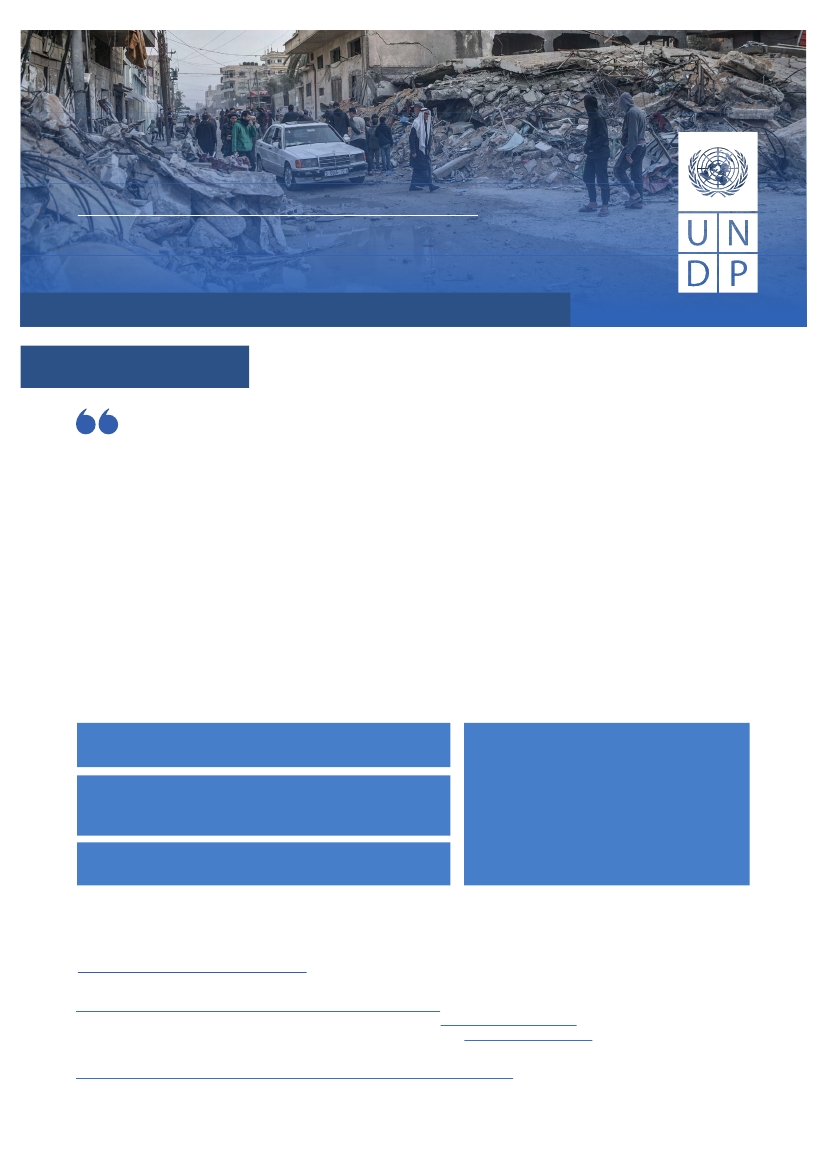
United Nations Development Programme
Programme of Assistance to the Palestinian People
UNDP/PAPP’s Support to Gaza Emergency
Response and Early Recovery Planning
Programmatic Updates
Situation Analysis
The nightmare in Gaza is more than a humanitarian crisis. It is a crisis of humanity.
1
Over eleven months of war have brought about unprecedented loss in human lives, with at least 41,272 Palestinians
killed (out of which around 60% are children, women, and elderly), over 95,551 more injured and thousands more still
missing under the rubble, as of 18 September 2024
2
. At least 1.9 million people in the Gaza Strip (90% of the entire
population) have become internally displaced, seeking refuge in overcrowded shelters and unsanitary makeshift
camps. The ongoing war has caused large-scale and unprecedented destruction of essential public and social
infrastructure, resulting in at least 42 million tonnes of debris
3
. More than 90% of municipalities have been facing either
complete cessation or severe disruption of service provision, across various municipal services
4
. Moreover, the war
has resulted in the collapse of solid waste management – evidenced by the unprecedented accumulation of solid
waste in the streets and the proliferation of unregulated temporary dumping sites, acting as breeding ground for
disease vectors and further exacerbating the already alarming public health crisis. UNDP/PAPP’s recent assessment
estimated that the solid waste management sector has su ered approximately $60 million in damages, up to end of
May 2024.
5
In addition to the humanitarian catastrophe unfolding in the Gaza Strip, the war is also having a profound
impact on human development and key socioeconomic indicators across the whole occupied Palestinian territory
(oPt), as highlighted by UNDP and ESCWA
6
in April 2024.
September 2024
After nine months of war, the Palestinian economy could lose
up to
29%
of its
Gross Domestic Product (GDP)
in 2024.
The
poverty
rate in the oPt is projected to surge from 38.8% to
60.7%,
as the war extends to nine months, increasing the
number of people living in poverty by an additional 1.86 million.
Unemployment
in the oPt could reach 47.8% by the ninth
month.
The
Human Development Index (HDI)
for the
State of Palestine is estimated to have dropped
from 0.716 in 2022 to 0.657 after eight months
of war,
setting human development progress
back to 2004 levels.
For the
West Bank,
scenarios indicate a
setback in HDI
between 13 and 16 years.
For
Gaza,
all scenarios set back human
development progress
by more than 20 years.
1 Press Conference by Secretary-General António Guterres at United Nations Headquarters, 6 November 2023.
2 OCHA. Reported impact snapshot | Gaza Strip (18 September 2024). Available at:
https://www.ochaopt.org/content/reported-impact-snapshot-gaza-strip-18-september-2024
3 UNOSAT. Gaza Strip 8th Comprehensive Damage Assessment - July 2024. Available at:
https://unosat.org/products/3904
4 UNDP/PAPP’s Gaza Insights on the Impact of the War on Municipalities in the Gaza Strip. Available at:
https://trello.com/c/HdN6Dame
5 UNDP/PAPP’s Gaza Insights on the Impact of the War on Solid Waste Management in the Gaza Strip.
6 UNDP, ESCWA (2024). Gaza War: Expected Socio-Economic Impacts on the State of Palestine. Available at:
https://www.undp.org/arab-states/publications/gaza-war-expected-socio-economic-impacts-state-palestine-0
1